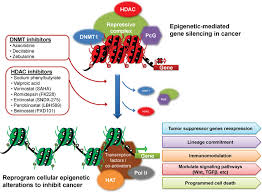DNA METHYLATION AND EPIGENETIC GENE SILENCING
DNA methylation is a reversible chemical modification of the cytosine in the CpG islands of promoter sequences, catalyzed by a family of DNA methyltransferases. DNA methylation does not change the genetic information but it just alters the readability of the DNA and results in the inactivation of gene by subsequent transcript repression. CpG island are the regions in DNA that contains many adjacent cytosine and guanine nucleotides. The ''p '' in CpG refers to the phosphodiester bond between the cytosine and the guanine. These islands occur in approximately 40% of the promoters of human genes. These
islands occur in approximately 40% of the promoters of human genes. DNA methylation plays a critical role in the control of cellular process including embryonic development , transcription, X- chromosome inactivation and genomic imprinting. DNA methylation occurs in the C5 positions of cytosines that precedes guanines and are called dinucleotide CpGs. The CpG dinucleotides are not found frequently throughout the human genome and present 20 % of its expected frequency. But approximately half of the human gene promoter regions have CpG rich areas of 0.5 to 2 kb in length. In which CpG dinucleotide frequency are higher than expected . These CpG rich areas are often known as CpG islands. . The majority (94%) of CpG island remain unmethylated in normal cell. But particular subgroups of promoters CpG are methylated such as tissue and germ line specific genes. In general , CpG island methylation causes gene silencing. The methylated CpG island also recruit histone deacetylases and other factor involved intranscriptional silencing . In activation of tumor suppressor genes through hypermethylation of CpG islands within promoters regions is a major event in carcinogenesis. Hypermethylation of CpG islands within promoter regions is a major event in carcinogenesis . Hypermethylation of CpG island also has silencing effect on miRNA in cancer. Micro RNA are short , 18-22 nucleotide, noncoding RNas that regulate many cellular functions including cell proliferation, apoptosis and differentiation by silencing specific target genes through translational repression or mrNa degradation.



No comments:
Post a Comment